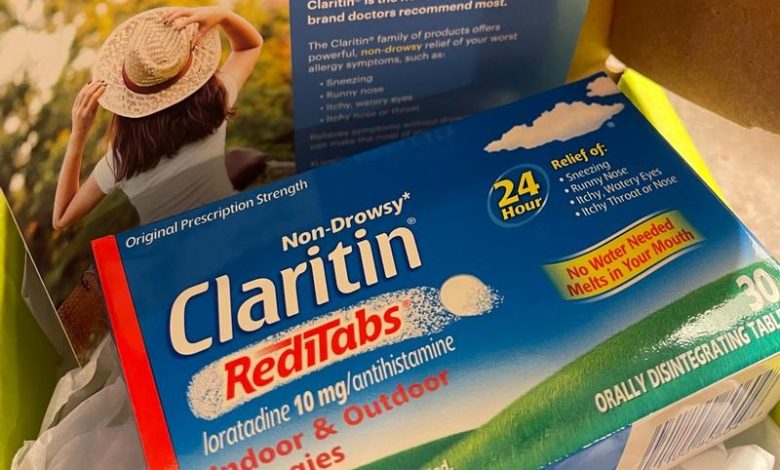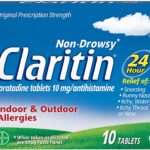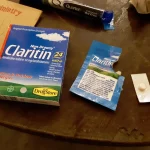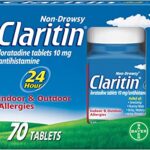I Accidentally Took 2 Claritin In 24 Hours

Claritin is a brand of loratadine, a medication that belongs to the class of drugs called second-generation antihistamines, specifically the class known as histamine receptor antagonists. It works by blocking the action of one of the body’s natural chemicals known as histamine. Histamine is responsible for many of the symptoms caused by allergies.
Claritin is used for the relief of symptoms associated with seasonal allergies, including sneezing, itchy and runny nose, and tearing and redness of the eyes. It is also used for the relief of symptoms associated with allergic skin conditions, including chronic hives and other skin disorders. Claritin is also used for the relief of symptoms associated with year-round allergies. Loratadine usually starts working within 2 hours and lasts for 24 hours.
How should Claritin be used?
Claritin comes as a syrup (liquid), a tablet, and a rapidly disintegrating (dissolving) tablet to take by mouth. It is usually taken once a day with or without food. Follow the directions on the package label carefully, and ask your doctor or pharmacist to explain any part you do not understand. Take loratadine exactly as directed. Do not take more or less of it or take it more often than directed on the package label or recommended by your doctor. If you take more loratadine than directed, you may experience drowsiness.
If you are taking the rapidly disintegrating tablet, follow the package directions to remove the tablet from the blister package without breaking the tablet. Do not try to push the tablet through the foil. After you remove the tablet from the blister package, immediately place it on your tongue and close your mouth. The tablet will quickly dissolve and can be swallowed with or without water.
The typical dosing for Claritin is as follows:
This medication comes in pills and oral liquids that are swallowed, chewable tablets that are chewed then swallowed, and orally disintegrating tablets that dissolve on the tongue.
Be sure to check the medication box for specific instructions. In general:
• Adults and children 6 years and older: The typical dose is 10 mg by mouth once per day. The maximum dose is 10 mg per day.
• Children 2 to under 6 years of age: The typical dose is 5 mg by mouth once per day. The maximum dose is 5 mg per day.
• Children under 2 years of age: Ask your child’s provider or view the table below:
| Child’s AGE (years) | 2-5 | 6-11 | 12+ | years |
| Liquid 5 mg/ 5 milliliters (mL) | 2.5 | 5 | 10 | mL |
| Liquid 5 mg/ 1 teaspoon (tsp) | ½ | 1 | 2 | tsp |
| Chewable 5 mg tablets | — | 1 | 2 | tablets |
| Tablets 10 mg | — | — | 1 | tablet |
Do not use Claritin to treat hives that are bruised or blistered, that are an unusual color, or that do not itch. Call your doctor if you have this type of hives.
Stop taking Claritin and call your doctor if your hives do not improve during the first 3 days of your treatment or if your hives last longer than 6 weeks. If you do not know the cause of your hives, call your doctor.
If you are taking Claritin to treat hives, and you develop any of the following symptoms, get emergency medical help right away: difficulty swallowing, speaking, or breathing; swelling in and around the mouth or swelling of the tongue; wheezing; drooling; dizziness; or loss of consciousness. These may be symptoms of a life-threatening allergic reaction called anaphylaxis. If your doctor suspects that you may experience anaphylaxis with your hives, he may prescribe an epinephrine injector (EpiPen). Do not use loratadine in place of the epinephrine injector.
What happens if I accidentally took 2 Claritin in 24 hours?
If you accidentally took 2 Claritin tablets in 24 hours, you may experience overdose symptoms such as headache, drowsiness, and fast or pounding heartbeat. Claritin-induced cardiotoxicity, including cardiac arrhythmias and prolongation of QT-interval, is possible in patients, especially in the elderly, if taking a higher than the recommended 24-hour dose.
Though rare, overdosing on Claritin may cause significant toxicity, including agitation and symptoms of anticholinergic syndrome. Symptoms include, but are not limited to, mydriasis, urinary retention, tachycardia, and skin flushing. If you have taken more than the recommended dose of Claritin, seek emergency medical attention or call the Poison Help line at 1-800-222-1222.
What are the side effects of Claritin?
Claritin may cause serious side effects including:
• fast or uneven heart rate,
• severe headache, and
• feeling lightheaded
Get medical help right away, if you have any of the symptoms listed above.
Common side effects of Claritin include:
• headache,
• sleepiness,
• feeling tired,
• drowsiness,
• fatigue,
• nervousness,
• stomach pain,
• diarrhea,
• dry mouth,
• sore throat,
• hoarseness,
• eye redness,
• blurred vision,
• nosebleed, or
• skin rash.
Tell your doctor if you experience serious side effects of Claritin including fast or uneven heart rate, feeling like you might pass out, jaundice (yellowing of your skin or eyes), or seizures (convulsions).
Claritin may cause serious side effects including:
• fast or uneven heart rate,
• severe headache, and
• feeling lightheaded
Get medical help right away, if you have any of the symptoms listed above.
Seek medical care or call 911 at once if you have the following serious side effects:
• Serious eye symptoms such as sudden vision loss, blurred vision, tunnel vision, eye pain or swelling, or seeing halos around lights;
• Serious heart symptoms such as fast, irregular, or pounding heartbeats; fluttering in your chest; shortness of breath; and sudden dizziness, lightheartedness, or passing out;
• Severe headache, confusion, slurred speech, arm or leg weakness, trouble walking, loss of coordination, feeling unsteady, very stiff muscles, high fever, profuse sweating, or tremors.
This document does not contain all possible side effects and others may occur. Check with your physician for additional information about side effects. You may find useful information on Can You Take Expired Claritin?





